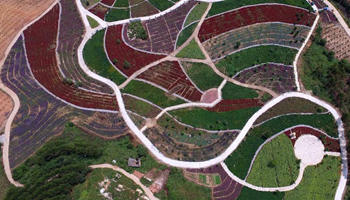by Ahmed Shafiq, Wang Xue
CAIRO, Sept. 26 (Xinhua) -- Mohammed Zeidan, an Egyptian potter, showed no hint of anger when the last worker at his pottery workshop decided to quit.
"He gets paid for the pieces we sell," 50-year-old Zeidan told Xinhua at his workshop. "We almost sold nothing this month, so he decided to leave."
His workshop is located in Al-Fustat Potters, a village east of Cairo, which is now the only place where Cairo's potters can work, since the government has closed most of the pottery furnaces across the capital in an attempt to deal with the environmental threats to residents.
Unsurprisingly, the move has turned the village into a ghost place because of the great business slump.
"Some 99 percent of workers have turned to other jobs because this business does not bring money anymore," Zeidan said. "This zone used to have 170 workshops, but only 30 are operating."
With a wry smile, the man said years of recessions have led hundreds of potters to close their workshops and he is considering shutting down his own to start a new business.
Zeidan, smoking a cigarette, said his family started making ceramics from his grandfathers.
He said pottery is one of the oldest professions in the world, not only in Egypt, adding that this craft needs to be learnt at a very early age as it is extremely difficult for adults to master.
"It is not really a craft, it is an art," he said proudly.
He said home and kitchen tools were mostly made of pottery a few decades ago.
"We inherited this industry from the pharaohs thousands of years ago. It was developed with time and had been an important industry for centuries until the recent three or four decades when people turned to new technologies. Then we relied on tourism to market our products," he explained.
The man revealed that he used to create very impressive designs, which were welcomed by tourists.
"But after tourism collapsed in Egypt, things are getting worse," he said.
"Now we focus on decorations, mainly outdoor and garden accessories which are not necessary for everyone," Zeidan said.
Egyptian tourism suffered a heavy blow following a Russian airplane crash in North Sinai last October, as countries including Britain and Russia suspended flights to Egypt after the incident.
Even before the plane crash, Egypt suffered a sharp decline in tourism due to three years of political turmoil, including two mass uprisings which toppled two presidents, which forced several countries to ban their citizens from visiting Egypt for safety reasons.
Zeidan, who earned nothing after a long tiring day, urged the government to move quickly to save this old profession.
"The government should do something before it is too late," he said as he closed the heavy wooden door of his workshop.
As Zeidan is gloomy about breathing life into this ailing industry, Ali Darwish, head of the Fustat Association for Pottery Production, is working hard to save the industry.
"I'm now focused on opening a school for young people to learn this art. There is a limited chance now because we are the last generation mastering this art," he told Xinhua.
The 60-something man said he has been working with government departments for this purpose.
"We are struggling to keep this profession alive. This industry is vanishing and the government should preserve it with us," he said.
"What really hurts my heart is that we are very good at this art, but the conditions have destroyed everything," he said. "The government should find the way to send our products to foreign markets. Otherwise, this industry will disappear in a few years."










